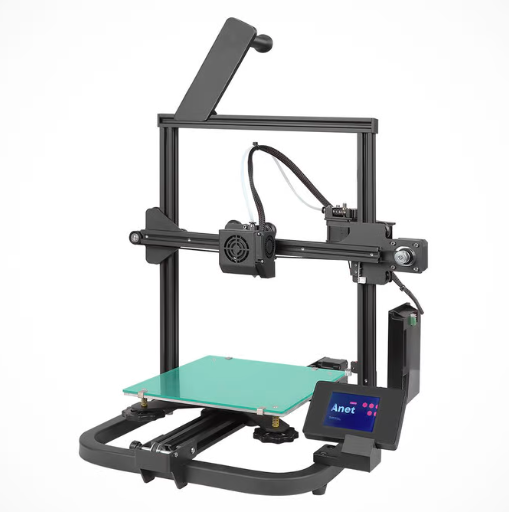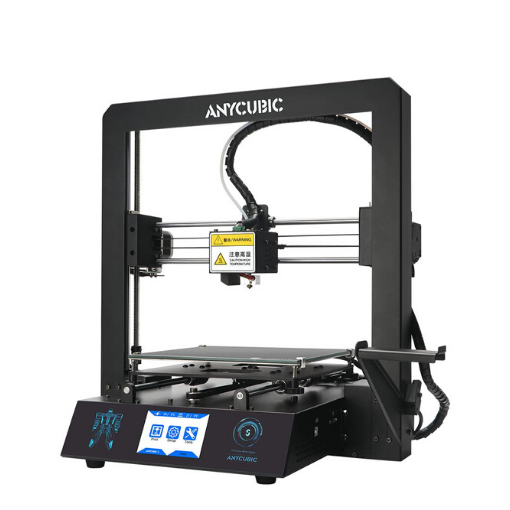Compare A8 V2 vs Mega S
Comparison between the best 3D printers
Choose the best 3D printer at the best price. The cheapest 3D printers are here.
Buy a 3D printer here with 3D Fila.
 |
 |
|
| Model | A8 V2 |
Mega S |
| Printing Material | Filament | Filament |
| Buy Filament for Anet A8 V2 | Buy Filament forAnycubic Mega S | |
| Estimated price | $129,00 | $149,00 |
| Manufacturer | Anet | Anycubic |
| Release Year | 2021 | 2019 |
| Print Volume [mm] | 220x220x250 | 210x210x205 |
| Printer Size [mm] | 428x441x486 | 405x410x452 |
| Weight [kg] | 6,2 | 14,5 |
| Power Loss Recovery | NO | YES |
| Enclosed printer | NO | NO |
| Bed Leveling | Manual | Manual |
| Filament End Sensor | NO | YES |
| Bed type | Heated | |
| Power supply system | Bowden | Bowden |
| Standard nozzle | 0,4 | 0,4 |
| Maximum Nozzle Temperature [°C] | 230 | 260 |
| Maximum Bed Temperature [°C] | 110 | |
| Maximum printing speed [mm/s] | 150 | 100 |
| Filament holder | YES | YES |
| Camera for supervision | NO | NO |
| Recommended filaments | PLA | PLA, TPU, ABS, PETG |
| Recommended slicers | Cura, Simplify, Slic3r, IdeaMaker | Cura, Simplify, Slic3r |
| Maximum Resolution [mm] | 0,1 | 0,1 |
| Processor | 8 bits | |
| Display | Display touchscreen 2,8'' | Touchscreen TFT 2,8'' |
| Power Supply | 110/220V / 250W | 12V / 300W |
| Connectivity | SD / USB | SD / USB |
| Operating systems | Windows, Mac, Linux | Windows, Mac, Linux |
| Date of registration in the system | 2022-11-10 | 2021-04-15 |
| Release date | 2021 | 2019 |
| Extra features | The Anet A8 V2 is a Cartesian-XZ type 3D printer with a build volume of 220 x 220 x 250 mm, Ender 3 design and V-slot assembly. It has a 32-bit motherboard and touchscreen interface, promising ease of use. It uses open source firmware and has thermal failure protection. It stands out for its cable organization and the absence of a heated bed, focusing on energy savings and PLA printing. It comes with an external power adapter, aiming at greater safety, especially for beginners and educational use. | The Anycubic Mega S offers a printing platform with excellent adhesion, easy removal after cooling. It has a filament sensor for a better experience with flexible materials and a multilingual and intuitive color touchscreen. Assembly is quick, requiring only 8 screws and 3 connections. It has a large build volume (210 x 210 x 205 mm), high positioning accuracy and supports a variety of materials, including TPU, PLA, ABS and wood. It stands out for its solid metal structure, superior stability, high-quality printing with layer resolution of up to 50 microns, Ultrabase for easy adhesion and removal of parts, resumption of printing after power outage, high-quality extruder for flexible filaments, suspended filament support and stable structure that reduces shaking, improving printing quality. |
| Support for multiple colors and materials (AMS and CFS) | NO | NO |
Notes * |
||
| Cost-benefit | 6 / 10 | 7 / 10 |
| Hardware | 0.5 / 10 | 2 / 10 |
| Tela | . | . |
| Print volume | 3 / 10 | 3 / 10 |
| Performance | 1 / 10 | 1 / 10 |
Conclusion |
| In concluding the comparison between the Anet A8 V2 and Anycubic Mega S, both printers present distinct advantages catering to different user needs in the 3D printing landscape. The Anet A8 V2, with a lower price point, is geared toward beginners and educational purposes, showcasing simplicity in its build and operation. However, it lacks some modern conveniences like power loss recovery and filament sensors, which may lead to challenges in long print jobs. On the other hand, the Anycubic Mega S, despite its higher cost, offers more robust features that enhance usability, including a filament sensor, power recovery, and a stronger structure which can contribute to better print stability and quality. Its versatility in accommodating various filament types allows for a broader range of projects compared to the Anet A8 V2, which primarily supports PLA. While both printers score similarly in cost-benefit analysis, the Mega S's hardware superiority and added features justify the price differential for users seeking reliability and flexibility. Therefore, if budget constraints are minimal and advanced features are desired, the Anycubic Mega S emerges as a more beneficial investment. Conversely, for those new to 3D printing who prioritize affordability, the Anet A8 V2 remains a viable option, offering essential functionality without the complexities of a higher-end machine. Ultimately, the best choice depends on the specific requirements and experience level of the user. |

